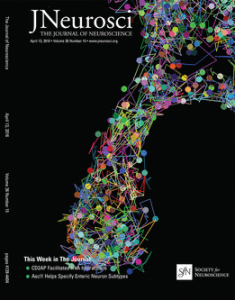 After the first author admitted to fraud, his colleagues have retracted a 2013 paper in the Journal of Neuroscience, as well as a 2015 book chapter about working memory.
After the first author admitted to fraud, his colleagues have retracted a 2013 paper in the Journal of Neuroscience, as well as a 2015 book chapter about working memory.
The retractions come as part of a backstory of pulled papers authored by psychologist Edward Awh and his former graduate student David Anderson when he was based at the University of Oregon in Eugene. The pair retracted four papers last year after Anderson admitted to misconduct during an investigation by the U.S. Office of Research Integrity (and spoke to us about it last July). This led Awh — now based at the University of Chicago in Illinois — to take a second look at the other publications he’d co-authored with Anderson; earlier this year, Awh retracted two others, and informed us more would be coming, including the two most recent publications.
First, let’s take a look at the retraction note for the Journal of Neuroscience paper, about remembered items and task performance:
At the request of the authors, The Journal of Neuroscience is retracting “Attending Multiple Items Decreases the Selectivity of Population Responses in Human Primary Visual Cortex” by David E. Anderson, Edward F. Ester, John T. Serences, and Edward Awh, which appeared on pages 9273–9282 of the May 29, 2013 issue. Subsequent to publication, a reanalysis of these data by authors Ester, Awh, and Serences revealed a problem. In the correlational analysis presented in Figure 7, two subjects were omitted without justification and in contradiction to the analytic approach reported in the methods section. Thus, because the paper was published in the context of an inappropriate analysis, all authors have agreed to a retraction.
The paper has been cited 10 times, according to Thomson Reuters Web of Science.
And here’s the retraction note for the 10th chapter in the book Mechanisms of Sensory Working Memory:
This article has been retracted: please see Elsevier Policy on Article Withdrawal (http://www.elsevier.com/locate/withdrawalpolicy). Because authors Awh, Vogel, and Brissenden no longer have confidence in the reported findings, this chapter is retracted with the agreement of all authors.
The book (and therefore its 10th chapter: “Statistical Regularities Allow Multiple Feature Values to Be Stored as Discrete Units“) is not indexed by Thomson Reuters Web of Science.
Albeit new, these retractions don’t come as a surprise: Awh previously informed us about them when we reported on his and Anderson’s previous retractions.
Regarding the Journal of Neuroscience retraction, he formerly told us:
…we found that the core empirical patterns observed in the BOLD data alone were replicated based on a completely new analysis of the raw data. However, there was a problem with the correlational analysis that was reported in Figure 7. Two of 14 subjects were omitted from this correlational analysis, in contradiction to the analyses that were described in the methods section as well as the statistics that were reported for other aspects of the data from that study. When all data points are included in this analysis, the reported correlation between neural activity and behavioral performance was not observed.
The authors have retracted a total of nine papers together: In February 2015, before the ORI report surfaced, Anderson and Awh pulled another Journal of Neuroscience paper because of an error in the analytic code. According to Awh, this retraction was unrelated to the misconduct.
Hat Tip: Kerry Grens
Like Retraction Watch? Consider making a tax-deductible contribution to support our growth. You can also follow us on Twitter, like us on Facebook, add us to your RSS reader, sign up on our homepage for an email every time there’s a new post, or subscribe to our new daily digest. Click here to review our Comments Policy. For a sneak peek at what we’re working on, click here.
Were there any consequences for Mr. Anderson? Where is he now?
Here is the consequences for Mr. Anderson:
https://ori.hhs.gov/content/case-summary-anderson-david
Surprisingly he is still allowed to do research! How can that be?!